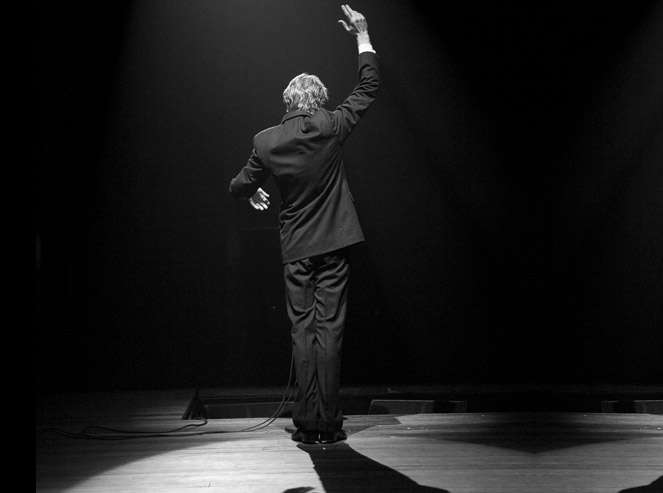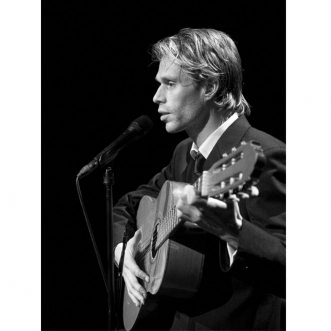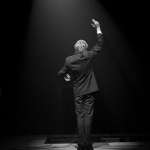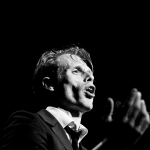chanson
Filip Jordens - Hommage à Brel

Présentation du spectacle
Filip Jordens - Hommage à Brel
Entouré de ses musiciens, l’acteur et chanteur Filip Jordens livre un hommage d’une virtuosité époustouflante au Grand Jacques, en incarnant littéralement et magistralement l’enfant terrible de la chanson française sur son terrain de prédilection : la scène. Ni imitation, ni adaptation : Filip Jordens préfère parler de "restauration", dans le respect de la partition. Le résultat du travail est d’une efficacité redoutable : la magie opère dès la première chanson, l’émotion brelienne est au rendez-vous.
Si la ressemblance physique est troublante, le talent du comédien belge est de nous restituer Brel en scène au plus près de l’original ; l'actualité de son répertoire n'en est que plus saisissante. Du timbre et des inflexions de la voix à la gestuelle du corps et à ses mimiques, il met sa science d’acteur et de chanteur, son corps et son âme, au service de l’incarnation fougueuse, généreuse et sincère du redresseur de plat pays.
« Par son talent, sa voix, son corps, avec la complicité de ses musiciens, Filip Jordens nous convie à retrouver le grand Jacques. C'est la puissance, la force, la rage, l'ironie, la tendresse de Brel qui soudain éclatent de nouveau. Grâce à cet interprète hors pair qu'est Filip Jordens, on peut alors mesurer combien l'œuvre de Brel non seulement est toujours vivante, mais aussi combien elle est singulière et actuelle. Brel poète, Brel visionnaire, Brel musicien, Brel comédien, Brel satiriste, Brel profondément humain. Un maître, en somme. Un classique, servi par un Filip Jordens habité et éblouissant.»
Philippe Claudel, écrivain et cinéaste
Biographie
Né en 1975 à Louvain, Filip Jordens est comédien de formation : il obtient sa maîtrise de théâtre au STUDIO HERMAN TEIRLINCK en 2000 et travaille depuis lors comme acteur, chanteur et metteur en scène freelance. Il a joué dans de nombreuses productions théâtrales sur la scène flamande, au sein de différentes compagnies et maisons théâtrales réputées comme BAD VAN MARIE, LUXEMBURG, HET KONINKLIJKE VLAAMS SCHOUWBURG, HET TONEELHUIS, HET PALEIS, etc.
Il a écrit ou coécrit plusieurs textes portés à la scène et est intervenu comme acteur dans quelques longs et moyens métrages de cinéma, ainsi que dans des séries télévisées. Comme chanteur et librettiste, il a collaboré à différents projets musicaux (notamment avec le NEDERLANDSE FILHARMONISCH KAMERORKEST d'Amsterdam, l'ensemble vocal GRAIN DE LA VOIX, etc.). Il donne régulièrement des cours de théâtre au CONSERVATOIRE ROYAL d'Anvers et collabore à différents projets culturels et littéraires en Flandre (STICHTING LEZEN, DE BUREN, VRIJSTAAT O, HET BESCHRIJF, SACRED PLACES, ART BASIC FOR CHILDREN, etc.).
Grand amateur de poésie française et quasi parfait bilingue, Filip Jordens joue également avec bonheur dans la langue de Molière. On a pu le voir dans les nombreuses représentations de Marius - La trilogie de Marcel Pagnol (avec le collectif DE ONDERNEMING /COMPAGNIE MARIUS) sur différentes scènes françaises (Gap, Istres, Martigues, Le Havre, Nantes, Sète, Foix, Tarbes,Toulon, Lyon, Caen). Fin juin 2015, on le retrouve sur la scène du 104 à Paris pour la première du monologue Le sec et l'humide de Jonathan Littell, dans une mise en scène de Guy Cassiers, dans le cadre d'une collaboration prestigieuse entre l'IRCAM à Paris et HET TONEELHUIS à Anvers.
Enfin, cela fait une quinzaine d'années que Filip Jordens tourne, accompagné de différentes formations musicales, avec son projet personnel Hommage à Brel, qu'il n'a cessé de nourrir et de peaufiner sur les scènes de Belgique, de France, des Pays-Bas et d'Allemagne. En 2004, il chante plus d'un mois dans le prestigieux théâtre BAR JEDERT VERNUNFT à Berlin. En 2011, en collaboration avec le compositeur et arrangeur Michel Bisceglia, il réalise une version symphonique de Hommage à Brel avec l'orchestre universitaire de Gand, dont les représentations remportent un vif succès en Flandre. En France, on a déjà pu le voir incarner avec talent le Grand Jacques à Amboise, Caylus, Châteauroux, Dunkerque, Joué-Lès-Tours, Marennes, Montargis, Vendôme et Cormeilles. En Belgique, outre de nombreuses dates et scènes en Flandre, Hommage à Brel a déjà fait le bonheur de centaines de spectateurs sur les scènes de différents théâtres et centres culturels à Andenne, Arlon, Ath, Auderghem, Binche, Bruxelles, Ciney, Dinant, Huy, Louvain-La-Neuve, Nivelles, Namur, Renaix, Ottignies, Uccle, Watermael-Boitsfort, Woluwé-Saint-Pierre et Woluwé-Saint-Lambert.
L'année 2016 est surtout marquée par la création et la présentation de Bewoond door Iets Groters : un spectacle théâtral, musical et littéraire autour de l'œuvre du Poète National Charles Ducal, ainsi que par toute une série de représentations du spectacle théâtral pour enfants Koud Vuur par la compagnie LUXEMBURG. Hommage à Brel est également en tête d'affiche du traditionnel Bal National du 20 juillet à Bruxelles, dans les Marolles : avec son quintette, il donne le meilleur de lui-même devant 12.000 personnes.
En 2017, Filip Jordens commence à travailler avec la compagnie de théâtre gantoise HOF VAN EEDE. Ensemble, ils créent Vanish Beach qui suscite l'enthousiasme de la presse et du public. En juillet de la même année, il redonne une série de représentations du monologue Le Sec et l'Humide, dans le cadre prestigieux du Festival d'Avignon, à l'invitation de son directeur Olivier Py. Le 3 septembre, il livre en plein un Hommage à Brel symphonique mémorable avec le ANTWERP SYMPHONY ORCHESTRA, en ouverture de leur saison, sous la direction du chef d'orchestre invité Paul Meyer, devant 4500 personnes à Anvers. Quelques semaines plus tard, il remet le couvert avec ses musiciens et le même orchestre dans la prestigieuse et flambant neuve salle Reine Elisabeth à Anvers, cette fois sous la direction du chef d'orchestre Fabien Gabel. Enfin, fin novembre 2017, le quintette d'Hommage à Brel donne son premier concert en Ouganda, à l'invitation de l'Ambassade de Belgique, dans la salle de concert de l'hôtel Sheraton de Kampala : les Ougandais comme les expatriés sont absolument conquis.
L'année 2018 est celle de la commémoration des 40 ans du décès de Jacques Brel : elle s'annonce donc riche de projets singuliers. Filip Jordens collabore ainsi au premier plan - en tant qu'interprète du Grand Jacques - au concert symphonique, documentaire et multimédia Je m'appelle Jacques Brel, dont la première aura lieu à Forest-National le 12 mai 2018. Et à l'automne, il interprétera le rôle-titre dans l'adaptation actualisée de L'Homme de la Mancha - une coproduction du KVS, THEATRE DE LIEGE et de LA MONNAIE. En outre, Filip Jordens a l'honneur de participer, en mars 2018, en compagnie de la chanteuse classique mondialement connue Marie-Nicole Lemieux, à une soirée culturelle et musicale à Ottawa, au Canada, dans le cadre de la visite officielle de ses Majestés le Roi Philippe et de la Reine Mathilde, en présence du Premier Ministre Justin Trudeau. Ce même mois, Hommage à Brel donnera également son premier concert en Italie, au TEATRO SPLENDOR à Aoste.
Anouar Brahem English Page
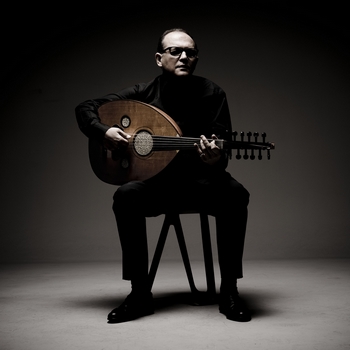
Anouar Brahem Quartet - New program 2024
Anouar Brahem : oud
Klaus Gesing : bass clarinet, soprano saxophone
Björn Meyer : bass
Khaled Yassine : darbouka, bendir
For almost forty years and with a current discography spanning no less than 11 albums on the ECM label, Anouar Brahem has been constantly placing the age-old tradition of Arab music, whose emblem is his oud and its superb finesse, in different situations; not only does he set it in contrast against the free spirit and improvisation so typical of modern jazz, but also against the sophisticated harmonies of the erudite compositional tradition of the West and the refined forms of composition in other ancient cultural traditions from the Orient.
He has organized numerous cross-cultural encounters as well as juxtaposing different musical universes, thereby producing unsuspected potential in new but familiarsounding combinations, something which had never been done before. In 2009, he recorded "The Astounding Eyes of Rita", with a new group that included the soft melding of two sounds: the amazing fluidity of German-born Klaus Gesing on bass clarinet and the flowing notes on the bass guitar of Swedish-born Björn Meyer, to give a mixture of ascetic sophistication and sensuous lyricism so typical of oriental music, declined here by the music of the oud with its notes closely interwoven into the percussive background, played by Lebanese artist, Khaled Yassine. This group has had worldwide
success, both for its rich repertoire and the subtlety of the varied instrumentation, and now, ten years later, it is not only totally up-to-the-minute and more enduring and creative than ever, but Anouar Brahem had made a secret pact with himself never to look back and also vowed to renew his inspiration constantly by accompanying each new project with unusual orchestral combinations. So here, recognizing the lasting qualities of this group, he decided to add a new chapter to this story.
His main resource has been these years of shared experiences with the group, where their coherence and self-confidence has been increasing all the time. Anouar Brahem's new adventure puts his own terrain through the prism of this particular sound universe once again, daring to cast a backward glance at his whole career by mixing a few familiar compositions of the quartet with a scattering of older themes from other projects. This leads to further exploration of the orchestral possibilities of a decidedly unusual instrumentation whose origins lie in an extremely up-to-date kind of cross-cultural chamber music. Within this hugely expansive space, Anouar Brahem and his fellowmusicians
create a softly refined, graceful and dream-like world, borrowed as much
from the contemplative oriental tradition as from jazz. The resulting music, rigorously demanding and poetic, moves constantly between modesty and sensuality, nostalgia and contemplation: it is a magnificently intimate spiritual journey to the heart of sound.
The Astounding Eyes of Rita
Album September 2009, ECM
2019 marks the tenth anniversary of the album. And the interest of the audience is still there, as if it was the first year.
With :
Anouar Brahem: oud
Klaus Gesing: bass clarinet
Björn Meyer: bass
Khaled Yassine: darbouka, bendir
A delightful new assembled by Tunisian oud master Anouar Brahem.
The combination of the bass clarinet with the oud suggests a link to Anouar's Thimar trio, but this East/West line-up often feels closer to the more traditionally-inclined sounds of Barzakh or Conte de l'Incroyable Amour. Klaus Gesing, from Norma Winstone's Trio, and Björn Meyer, from Nik Bärtsch's Ronin, are both players with an affinity for musical sources beyond jazz, and they interact persuasively inside Brahem's music.
A dance of dark, warm sounds, urged onward by the darbouka and frame drum of Lebanese percussionist Khaled Yassine. The album is dedicated to the memory of Palestinian poet Mahmoud Darwish.
Souvenance
Music for oud
Album January 2015, ECM
This project is performed in 2 formations:
- the quartet
with Anouar Brahem (oud), François Couturier (piano), Klaus Gesing (bass clarinet ), Björn Meyer (bass)
- the quartet plus a string orchestra of 20 musicians
Probably Anouar Brahem has never gone so far into the balance between formal elegance and freedom of expression, lyricism and restraint, sensuality and asceticism, as he does here with this new repertoire which seems to ideally synthesize almost fifteen years of his personal and aesthetic quest for an authentic "common understanding" between Orient and Occident. Leading a brand-new Quartet, Brahem here revisits every facet of a musical universe that is at once melancholy and introspective in integrating his sensibilities and instrumental languageundeniably anchored in the Arab traditionwith the Impressionist, evanescent piano of colourist François Couturier, the pulsing sensuality of Björn Meyer's electric bass, and the misty, dreamlike, Nordic romanticism from the bass clarinet of Klaus Gesing.
As if to further emphasize the hybrid nature of his universe, here Brahem plunges his quartet for the first time into the sound-fabric of arrangements that are both sumptuous and minimalist, orchestrating a string-ensemble where the soloists (beginning with the melodic enchantments of the oud) are presented in an organic, voluptuous setting which is particularly stimulating. With ever more refinement in its melodic lines and at once contemplative and subtly narrative in its developments, the music contained in Souvenance possesses those qualities of self-evidence, naturalness and simplicity which are the hallmarks of works of genuine inspiration.
Other show already toured :
Blue Maqam
Album October 2017, ECM
Anouar Brahem: oud
Dave Holland: doublebass
Jack DeJohnette: drums
Django Bates: piano
Prestigious European tours in April 2018 and March 2019 :
Uppsala, Konsert & Kongress (Sweden) | Berlin, Boulez Saal (Germany) | London, Barbican (England) | Dublin, The National Concert Hall (Ireland) | Lyon, Auditorium (France) | Anvers, De Roma (Belgium) | Luxembourg, Philharmonic (Luxembourg) | Morges, Théâtre de Beausobre (Switzerland) | Köln, Kölner Philharmonic (Germany) | Paris, Paris Philharmonic (France) | Blagnac, Odyssud (France) | Zurich, Tonhalle (Germany) | Basel, Musical Theater (Switzerland) | Munich, Philharmoni (Germany) | Hamburg, Elbphilharmonic (Germany) | Lisbon, Gulbenkian Música (Portugal) | Brussels, Palais des Beaux-Arts (Belgium)
Biography
For almost forty years, Anouar Brahem, Tunisian composer and oud master, has been creating music both rooted in a highly sophisticated but ancestral culture and eminently contemporary in its global ambition. Anouar appears in many cross-cultural encounters, as well as developing entirely new links and similarities between styles and worlds whose potential closeness had never been considered until he discovered them. For him it was (and still is) a matter of highlighting the age-old Arab tradition of learned music, represented in its finesse by his oud, not only by confronting his instrument with modern jazz, but also with the sophisticated harmonies of the erudite compositional tradition of the West and refined forms from other ancient cultural traditions from the Orient.
His 11 albums on ECM, label acclaimed by the public and international critics alike (including Astrakan Café, Thimar, Le Pas du Chat Noir, Blue Maqams etc.), together with the triumphant success of his haunting music in concerts held in prestigious halls throughout the world, and his fellow-musicians including a remarkable selection of famous jazzmen such as Jan Gabarek, Dave Holland and jack DeJohnette are sufficient evidence to confirm Anouar's place as one of the most fascinating and inspirational artists in the current world of instrumental music.
His sensitive yet rigorous music constantly redefines a cleverly composite universe of poetry and culture, ever balancing between discretion and sensuality, nostalgia and contemplation.
Awards
De Klara's Classical Music Awards: "Best International CD - World" for Blue Maqams (Belgium, 2018)
Echo Jazz Award: "Best International Musician of the Year" for The Astounding Eyes of Rita (Germany, 2010)
Edison Award for Le Voyage de Sahar (The Netherlands, 2006)
Preis der Deutschen Schallplattenkritik (German Record Critics' Award) for Thimar (Germany, 1998)
National Music Award (Tunisia, 1985)
Reviews
The album is at once an extension and an audacious departure from the tradition of the oud. Despite his formidable knowledge of the maqarnat, an ornate system of modes that anchors Arabic music, he seldom bases his improvisations directly on the maqams. His phrasing is pure and uncluttered, expressing itself through silence nearly as often as sound. ... Composed of elegantly flowing lines and somber, breathlike silences, the music shimmers with the overtones of the piano. ... Mr. Brahem bases several of the tunes on spare, broken chords, repeated in the childlike manner of Satie. Simple though they are, however, they contain beguiling Arabesques. The three musicians rarely appear at once, performing as a trio on only seven of the album's 12 tracks. For the most part, you hear duets - piano and oud, oud and accordion, accordion and oud. The musicians often double each other's lines, but seldom in unison, which enhances the music's intimacy while producing a floating, echo effect.If every band projects "an image of coummunity," as the critic Greil Marcus once suggested, then Mr. Brahem's trio - part takht, part jazz trio, part chamber ensemble - evokes a kind of 21st century Andalusia, in which European and Arab sensibilities have merged so profoundly that the borders between them have dissolved. The image may be utopian, but its beauty is undeniable.
Adam Shatz, The New York Times
Throughout the record, the musicians maintain an exquisite balance and make only subtle changes in tempo or tone. Their sense of melancholy is so natural and comfortable it's childlike. On this tune, "Leila and the Land of the Carousel" a waltzing rhythm and revolving melody suggest a girl on that classic joyride...When he quit the oud for a while and played the piano instead, Anouar Brahem recovered his powers of musical myth-making. On this record, he creates a fairy tale setting and ultimately a storybook ending. The accordion lays down sustained chords like lengthening shadows in a forest. The piano conjures low-key sunlight and offers overtones of reconciliation. And in the arabesque path of "The Black Cat's Footsteps," Brahem finds a way back home to his beloved oud and to the songbird inside.
"All things considered", USA - National Public Radio
Son
Aucun son disponible pour cet artiste
Vidéo
Filip Jordens
Juillet 2016 @ Bal National, Bruxelles, Belgique
Filip Jordens
Trailer
Filip Jordens
Mars 2016 @ Ostende, Belgique
Ute Lemper
Last tango in Berlin



